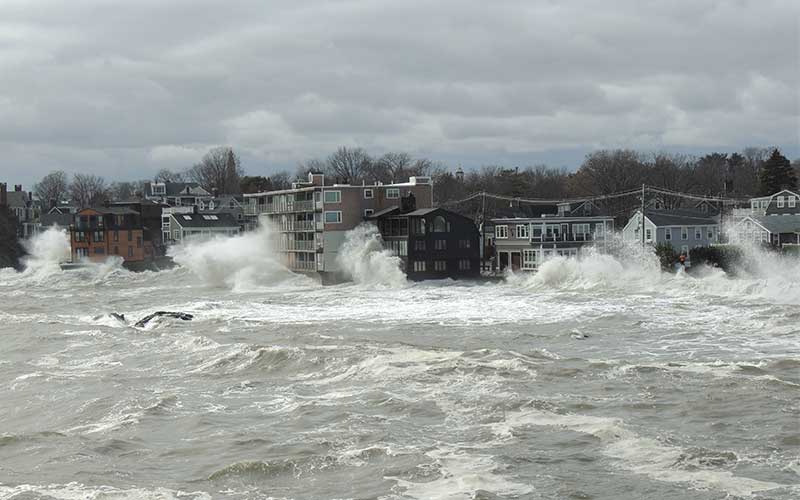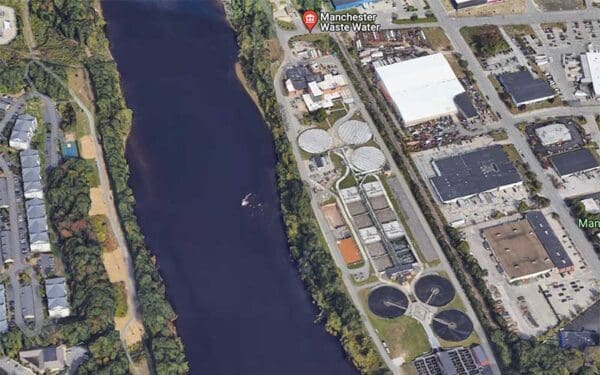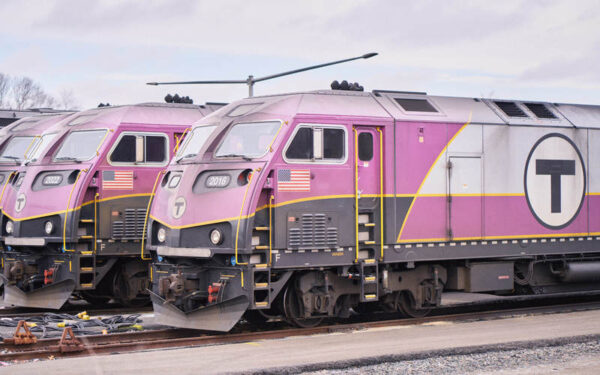
Climate acts are here now, but our communities aren't prepared. Two new bills will ensure that Massachusetts adapts to our new climate reality. Photo: Erik K. Smith via Shutterstock
Every year, more and deadlier severe weather occurs across the country. Bomb cyclones, historic flooding, record-breaking hurricanes, and wildfires have become the new normal.
In New England, we know that climate change will bring higher temperatures, more and heavier rainfall, a rising sea level, and more intense storms. These changes will have an extraordinary effect on our buildings, roads, bridges, and other infrastructure. But right now, there’s no guarantee that our infrastructure – and, by extension, our residents – will be safe from harm. Just last month, we saw images of flooded roads, yards, and downed trees across Massachusetts caused by heavy rain.
While cutting our climate-damaging emissions remains critical to combatting climate change, we must also prepare for the impacts we know are coming. If we don’t, the consequences will become much more dire – and much more expensive – in the future.
Two bills introduced in the Massachusetts legislature this session could lead the way for the rest of New England to adapt to our new climate reality.
The Evidence Is Clear: Climate Impacts Are Here Now
During the 2021 hurricane season alone, we witnessed widespread damage in Louisiana from Hurricane Ida. The remnants of that deadly storm also caused catastrophic flooding across the Northeast. That storm hit just a week after Hurricane Henri became the first tropical cyclone to make landfall in Rhode Island since 1991, leaving 50,000 customers across New England without power – some for several days.
While both storms caused immediate destruction upon landfall, their aftermath also proved deadly as hundreds of people without power suffered through excessive summer heat.
Even more troublesome is the recent report from the United Nations’ Intergovernmental Panel on Climate Change (IPCC) revealing that the rate of Earth’s warming is greater than we thought – making it even more urgent that we address climate impacts.
Plans Are Good, but Now We Need Action
Adapting to climate change means preparing our communities for changing conditions. We must ensure that our built (like buildings and roads) and natural (like parks and wetlands) systems can withstand and bounce back from extreme weather.
Some developers have already started to protect their buildings voluntarily. They have elevated land and incorporated nature-based measures like living shorelines and berms that can absorb or rebuff high waters. Cities and towns in Massachusetts also are evaluating ways to upgrade infrastructure like dams and roads to withstand more severe storms.
Across the Commonwealth, many examples show that adaptation is both possible and a good investment. (Spaulding Rehabilitation Hospital in the Charlestown Navy Yard offers just one example of smart, resilient design.)
But voluntary actions only go so far. The State has several voluntary programs and incentives to encourage climate adaptation. However, they are not enough to create a noticeable change in how we plan, design, or develop infrastructure or use land.
Climate resilience is still viewed as a bonus – an additional, optional layer of protection – rather than a minimum requirement for health and safety.
What’s more, we are building too many new roads, buildings, and other infrastructure based on past climate patterns rather than our present reality or future conditions. Relying only on that historical data makes it impossible to address the social, environmental, and fiscal risks we face when our critical infrastructure and communities are unprepared.
This is even more concerning given the rapid pace of development in Boston and other cities across the Commonwealth. (Listen to our teleconference about building a climate-resilient New England here.)
New Laws Would Help to Protect People and Property from Climate Impacts
Two bills introduced this session in the Massachusetts legislature address this shortcoming. Filed by Representative Sarah Peake (H.980) and Senator Nick Collins (S.501), the bills will mandate that state government:
- considers and addresses the reasonably foreseeable risks of climate change when it reviews proposals for new development,
- provides financing for projects through grants or tax breaks, and
- issues requests for proposals on its own capital projects like state roads and bridges.
In addition, utility providers like National Grid and Eversource would be required to incorporate climate adaptation planning into their facilities. Finally, the bills mandate that the state’s building codes be updated to incorporate climate risk.
The requirements for different types and sizes of projects would likely vary. But, at minimum, new projects that need state approval or funds would be required to consider climate impacts and show their ability to adapt. That means projects must be designed, built, and maintained to withstand flooding from storm surge, heavy rain and snow, and sea level rise, as well as more extreme temperatures and wind speeds and more.
These bills will not only promote more sustainable investment throughout the Commonwealth; they will also help safeguard our economy and increase fiscal responsibility. Taxpayer dollars should not be spent on development and infrastructure that we know is unsustainable, not to mention that put lives at risk.
The Only Bills Focused on Climate Standards
These two bills (H.980 and S.501) address the need for a comprehensive set of statewide standards for climate change. Several other bills filed this session focus either on cutting climate-damaging emissions or increasing revenue to pay for climate adaptation and resilience efforts. These, too, are critical, but they will be less effective without a larger framework for action.
We need the legal teeth to mandate action on all of the State’s existing climate plans and data. H.980 and S.501 will provide that.
Here is everything these bills would do:
- Create consistency and predictability: These bills will ensure that everyone uses the same and most up-to-date information to plan for and act on climate risks. Ratherthan a patchwork of local policies that stretch legal resources, consistent and predictable state policies will provide for reliable and stable regulatory approaches to investments and assets.
- Smart investments in safe infrastructure: The Commonwealth will be mandated to consider and disclose the reasonably foreseeable risks of climate change in state licensing and permitting decisions, financing, and capital projects. Investor-owned utility companies will also have to identify and adapt to climate risks for essential facilities and equipment and consider climate risks in the siting of new energy infrastructure.
- Update building codes to address climate risk: Updated building codes will account for more extreme temperatures, precipitation, and sea level rise. Cities and towns regulating local development will also have the option to use alternative floodplain maps based on more accurate data than the current, insufficient Federal Emergency Management Agency floodplain maps.
- Adapt to climate risks equitably: Any analysis of and adaptation to climate risks will have to ensure those measures do not have harm our most vulnerable communities, including low-income and minority populations disproportionately. For example, flood water cannot be diverted from a wealthy at-risk neighborhood to a low-income one.
- Provide education and training: The bills will establish a state-led program to educate members of local boards and commissions (like planning and zoning boards or conservation commissions) about the risks of climate change. Better trained board members will lead to better results.
What Can You Do?
We deserve cities and towns that can weather the climate impacts we know are coming. Taxpayers shouldn’t have to foot what will surely be an expensive bill because we’re not planning properly for the future.
You can help by calling your legislator today. Tell them that we need to make sure our critical infrastructure is protected from climate impacts, and ask them to vote yes on H.980 and S.501.




